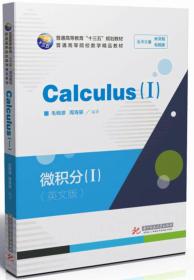
Calculus
¥ 13.64 6.7折 ¥ 20.5 九品
仅1件
北京昌平
认证卖家担保交易快速发货售后保障
作者[加]马继刚;邹云志;艾奇逊
出版社高等教育
出版时间2010-07
装帧其他
货号A8
上书时间2024-12-09
- 在售商品 暂无
- 平均发货时间 15小时
- 好评率 暂无
- 最新上架
商品详情
- 品相描述:九品
图书标准信息
- 作者 [加]马继刚;邹云志;艾奇逊
- 出版社 高等教育
- 出版时间 2010-07
- ISBN 9787040292084
- 定价 20.50元
- 装帧 其他
- 开本 其他
- 纸张 其他
- 页数 226页
- 【内容简介】
-
《微积分(1)》是英文版大学数学微积分教材,分为上、下两册。上册为单变量微积分学,包括函数、极限和连续、导数、中值定理及导数的应用以及一元函数积分学等内容;下册为多变量微积分学,包括空间解析几何及向量代数、多元函数微分学、重积分、线积分与面积分、级数及微分方程初步等内容。
《微积分(1)》由两位国内作者和一位外籍教授共同完成,在内容体系安排上与国内主要微积分教材一致,同时也充分参考和借鉴了国外尤其是北美一些大学微积分教材的诸多特点,内容深入浅出,语言简洁通俗。
《微积分(1)》适合作为大学本科生一学年微积 - 【目录】
- CHAPTER 1 Functions, Limits and Continuity 1.1 Mathematical Sign Language 1.1.1 Sets 1.1.2 Number 1.1.3 Intervals 1.1.4 Implication and Equivalence 1.1.5 Inequalities and Numbers 1.1.6 Absolute Value of a Number 1.1.7 Summation Notation 1.1.8 Factorial Notation 1.1.9 Binomial Coefficients 1.2 Functions 1.2.1 Definition of a Function 1.2.2 Properties of Functions 1.2.3 Inverse and Composite Functions 1.2.4 Combining Functions 1.2.5 Elementary Functions 1.3 Limits 1.3.1 The Limit of a Sequence 1.3.2 The Limits of a Function 1.3.3 One-sided Limits 1.3.4 Limits Involving the Infinity Symbol 1.3.5 Properties of Limits of Functions 1.3.6 Calculating Limits Using Limit Laws 1.3.7 Two Important Limit Results 1.3.8 Asymptotic Functions and Small o Notation 1.4 Continuous and Discontinuous Functions 1.4.1 Definitions 1.4.2 Building Continuous Functions 1.4.3 Theorems on Continuous Functions 1.5 Further Results on Limits 1.5.1 The Precise Definition of a Limit 1.5.2 Limits at Infinity and Infinite Limits 1.5.3 Real Numbers and Limits 1.5.4 Asymptotes 1.5.5 Uniform Continuity 1.6 Additional Material 1.6.1 Cauchy 1.6.2 Heine 1.6.3 Weierstrass 1.7 Exercises 1.7.1 Evaluating Limits 1.7.2 Continuous Functions 1.7.3 Questions to Guide Your RevisionCHAPTER 2 Differential Calculus 2.1 The Derivative 2.1.1 The Tangent to a Curve 2.1.2 Instantaneous Velocity 2.1.3 The Definition of a Derivative 2.1.4 Notations for the Derivative 2.1.5 The Derivative as a Function 2.1.6 One-sided,Derivatives 2.1.7 Continuity of Differentiable Functions 2.1.8 Functions with no Derivative 2.2 Finding the Derivatives 2.2.1 Derivative Laws 2.2.2 Derivative of an Inverse Function 2.2.3 Differentiating a Composite Funetion--The Chain Rule 2.3 Derivatives of Higher Orders 2.4 Implicit Differentiation 2.4.1 Implicitly Defined Functions 2.4.2 Finding the Derivative of an Implicitly Defined Function 2.4.3 Logarithmic Differentiation 2.4.4 Functions Defined by Parametric Equations 2.5 Related Rates of Change 2.6 The Tangent Line Approximation and the Differential 2.7 Additional Material 2.7.1 Preliminary result needed to prove the Chain Rule 2.7.2 Proof of the Chain Rule 2.7.3 Leibnitz 2.7.4 Newton 2.8 Exercises 2.8.1 Finding Derivatives 2.8.2 Differentials 2.8.3 Questions to Guide Your Revision 3 The Mean Value Theorem and Applications of theCHAPTER 3 The Mean Value Theorem and Applications of the Derivative 3.1 The Mean Value Theorem 3.2 L'Hospital's Rule and Indeterminate Forms 3.3 Taylor Series 3.4 Monotonic and Concave Functions and Graphs 3.4.1 Monotonic Functions 3.4.2 Concave Functions 3.5 Maximum and Minimum Values of Functions 3.5.1 Global Maximum and Global Minimum 3.5.2 Curve Sketching 3.6 Solving Equations Numerically 3.6.I Decimal Search 3.6.2 Newton's Method 3.7 Additional Materia 3.7.1 Fermat 3.7.2 L'Elospital 3.8 Exercises 3.8.l The Mean Value Theorem 3.8.2 L'Hospital's Rules 3.8.3 Taylor's Theorem 3.8.4 Applications of the Derivative 3.8.5 Questions to Guide Your RevisionCHAPTER 4 Integral Calculus 4.1 The Indefinite Integral 4.1.1 Definitions and Properties of Indefinite Integrals 4.1.2 Basic Antiderivatives 4.1.3 Properties of Indefinite Integrals 4.1.4 Integration By Substitution 4.1.5 Further Results Using Integration by Substitution 4.1.6 Integration by Parts 4.1.7 Partial Fractions in Integration 4.1.8 Rationalizing Substitutions 4.2 Definite Integrals and, the Fundamental Theorem of Calculus 4.2.1 Introduction 4.2.2 The Definite Integral 4.2.3 Interpreting ∫f(x) dx as an Area 4.2.4 Interpreting ∫f(t) dt as a Distance 4.2.5 Properties of the'Definite Integral 4.2.6 The Fundamental Theorem of Calculus 4.2.7 Integration by Substitution 4.2.8 Integration by Parts 4.2.9 Numerical Integration 4.2.10 Improper Integrals 4.3 Applications of the Definite Integral 4.3.1 The Area of the Region Between Two Curves 4.3.2 Volumes of Solids of Revolution 4.3.3 Arc Length 4.4 Additional Material 4.4.1 Riemann 4.4.2 Lagrange 4.5 Exercises 4.5.1 Indefinite Integrals 4.5.2 Definite Integrals 4.5.3 Questions to Guide Your RevisionAnswersReference Books
点击展开
点击收起
相关推荐
— 没有更多了 —




















以下为对购买帮助不大的评价